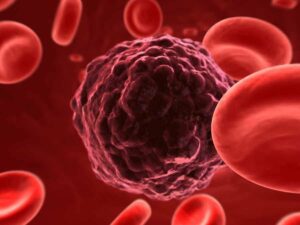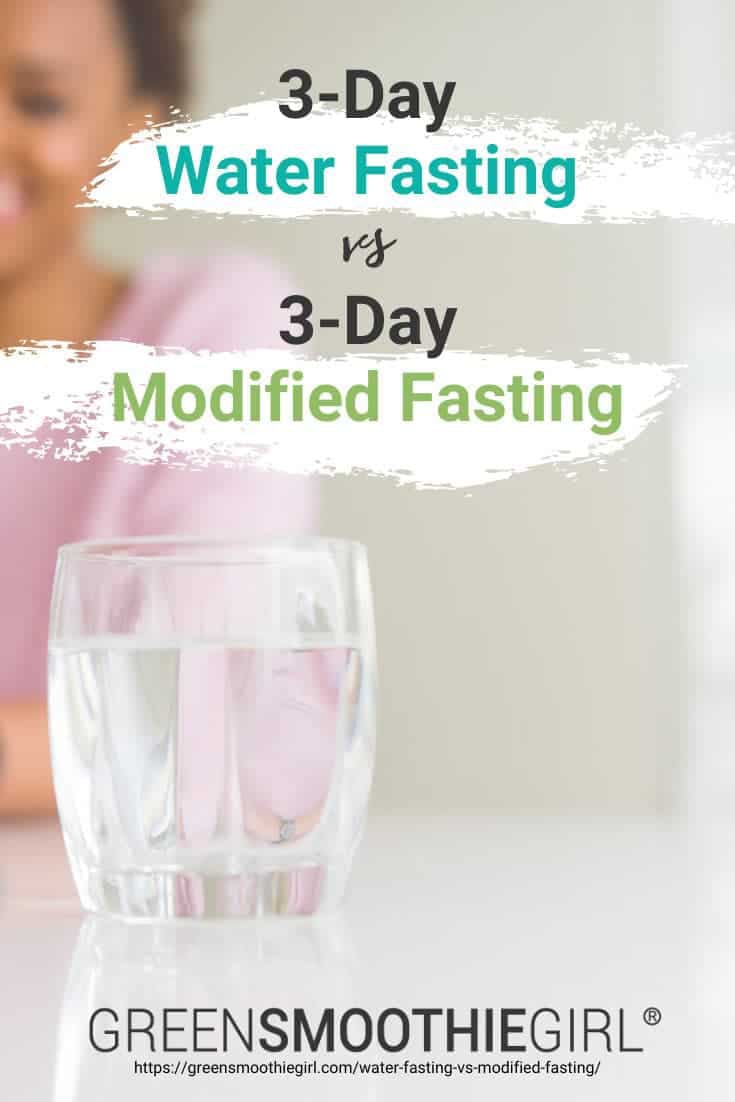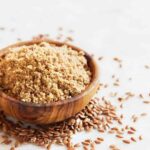3-Day Water Fasting vs. 3-Day Modified Fasting

The “more is better” and “no pain, no gain” mindsets are so ingrained in our cultural consciousness that we even apply them to fasting.
If dramatically reducing our calorie intake during a modified fast yields impressive health benefits, surely abstaining from all calories — and really feeling that hunger— would be even better!
Don’t get me wrong: A three-day water fast can be wonderful. I’ve done it myself. (In fact, I’ve done a 12-day water fast.)
But don’t be so quick to assume that the most intense path is the most beneficial. Let’s take a look at how a three-day water fast stacks up to a three-day modified fast of 650-800 clean, nutrient-dense calories per day.
In this article:
- Health Benefits of Water Fasting & Modified Fasting
- Is Water Fasting Better Than Modified Fasting?
- Advantages of Water Fasting
- Disadvantages of Water Fasting
- Advantages of Modified Fasting
- Disadvantages of Modified Fasting
- Conclusions About 3-Day Water Fasting vs. 3-Day Modified Fasting
Health Benefits of Water Fasting & Modified Fasting
Many people are surprised to learn that the health benefits of water fasting (zero calorie intake) and modified fasting (a daily calorie limit of 650-800 in nutrient-dense foods, consumed in an eating window of 8-12 hours) are the same.
[Related: Modified Fasting 101: The Ultimate Beginner's Guide]
Groundbreaking new research by Valter Longo1 showed that both water fasting and modified fasting offer the following health benefits:
Increased Autophagy
Your cells are hardwired to take advantage of food scarcity by diverting energy typically spent on digestion to “cleaning house” (recycling damaged proteins and eliminating waste).
However, in modern America, most of us hardly ever miss a meal — and we eat late into the evening. Both water fasting and modified fasting give your cells a much-needed chance to turn up the volume on autophagy.
Cellular Repair and Regeneration
One of the most important functions of autophagy is triggering a flurry of cellular repair and regeneration2 in worn-out, nonfunctional, or damaged cells. For instance, one study showed that pre-diabetic mice were able to regenerate their pancreatic β cells3 through modified fasting — and start producing normal levels of insulin again.
Even if you’re eating a mostly raw, nutrient-dense diet, your body is still working hard to run damage control on waste buildup and cellular damage that comes from oxidative stress, the chemical load in your environment, and even normal biological processes like digestion.
Waste Management and Detoxification
Autophagy also helps clear out waste buildup2 that accumulates in your cells over time, from environmental toxins, oxidative stress, and normal cellular functions. This is one of the reasons we sleep every night, and one of the reasons we instinctively don’t feel like eating when we’re sick: time to clean house!
[Related: How To Induce Autophagy Without Going Hungry]
Immune Boosting
A 2019 study showed that mice who were fasting could knock out a virus in just two days,13 compared to a control group that took an entire week. Fasting helps boost immunity in all sorts of ways. Autophagy clears out toxins and wastes that are bogging your system down, while simultaneously stimulating regrowth and vitality of cells in every single organ and metabolic process.
Lowered Inflammation
Fasting decreases inflammation caused by oxidative stress and free radicals.4 How? The currency of energy in our cells is glucose. Processing glucose creates byproducts called free radicals (unpaired molecules that can cause a lot of damage in the human body), and monocytes5 (cells that cause inflammation). Giving cells a break from processing glucose all day helps your body get a handle on both oxidative stress and free radicals— and in turn, inflammation.
Improves Inflammatory Diseases
It should come as no surprise then that both water fasting and modified fasting improve inflammatory diseases including arthritis, irritable bowel syndrome, Crohn’s, and psoriasis.6 Many people see a noticeable difference both during and after a fast.

Weight Loss
Fasting and weight loss are natural partners. Not only does fasting help dramatically improve insulin sensitivity and blood sugar levels,7 but it puts the body into mild nutritional ketosis and allows it to use fat stores for energy.
The average participant in my Flash Fast program lost 4 pounds in just three days of modified fasting.
Mental Health Benefits
Check this out: Fasting has been shown to have the same impact as antidepressants.8 How? Most researchers have shown that autophagy during fasting helps clean house on the brain’s neurons, spurs the creation of new neurons, and increases the production of brain-derived neurotrophic factor9 (BDNF), which protects neurons from damage and oxidative stress).
Nerve Cell Function
Did you know that there’s only one thing that has been proven to reverse damage from multiple sclerosis in nerves cells10 — and it isn’t a drug? It’s fasting. Fasting helps regenerate the protective coating, or sheaths,11 on nerve cells, allowing them to communicate with each other again.
Destroys Cancerous and Precancerous Cells
One study at USC showed that fasting regularly helped compound damage to cancer cells, while keeping healthy cells stronger12 during a course of chemotherapy.
But fasting isn’t just useful for an actual diagnosis of cancer. At any given time, each of us has mutated and damaged cells in our bodies that have the potential to grow and develop into cancer. Regular fasting helps clear those cells out before they can gain a foothold.

Improves Insulin Sensitivity, Metabolic Syndrome, and Diabetes
A landmark study in 2017 showed that pre-diabetic mice began regenerating pancreatic β cells3 and producing their own insulin normally3 through a course of fasting. This is fantastic news for anyone at risk for diabetes or who has problems with high-blood sugar!
Improves Heart Health
After just three cycles of a type of modified fast called the Fasting-Mimicking Diet, participants in one study walked away with lower blood pressure, lower cholesterol, and lower body fat percentages. They also showed significant improvement in their C-reactive protein measurements14 (a type of inflammatory protein that’s strongly linked with heart disease).

Is Water Fasting Better Than Modified Fasting?
So, to answer the question on everybody’s mind: Is water fasting better than modified fasting?
I’ll let the benefits above speak for themselves: BOTH water fasting and modified fasting yield INCREDIBLE (and basically identical) health benefits. So, which one should you choose? The short answer is whichever method of fasting is most compatible with your personality and lifestyle. Each method also has a few distinct advantages and disadvantages that may help you decide. Let’s take a look:
Advantages of 3-Day Water Fasting
Water fasting comes with a couple of unique advantages:
Slightly More Weight Loss
Three days of zero caloric intake will, naturally, encourage a slightly higher rate of weight loss than modified fasting for 3 days. If you have very significant amounts of weight to lose, you may find that this slight advantage is important to you.
No Food Prep Required
With a water-only fast, you won’t need to spend any time preparing food or counting calories. Some people enjoy the extra time in their day, and may even use the experience as an opportunity to refocus mentally or spiritually, without any kind of distraction from food.

Disadvantages of Water Fasting
A water-only fast also comes with some disadvantages that are worth careful consideration before you take the plunge:
Isolation May Be Necessary
I can tell this you from personal experience of doing several water-only fasts at a Hindu ashram in Texas. Why did I travel there? Because, like most people, I knew I wouldn’t last longer than a day in my own home, next to my own cupboards, within a 3-minute drive from my favorite Thai restaurant. Abstaining completely from food isn’t exactly compatible with modern life, social outings, and work.
Hunger Pangs Can Be Intense
While some people get that “runner’s high” after a day or so of fasting, others (myself included) just feel really, really hungry the whole time. Those hunger pangs can be extremely intense and distracting, making it harder to engage with work, social connections, and everyday life.
Dangerous for Some People
Water fasting is intense. Some individuals simply should NOT go without food unless they are closely medically supervised. This includes people with diabetes, people who are taking medications, and people who are pregnant to name a few. When in doubt, talk to your functional medical practitioner FIRST.
Risk of Electrolyte Imbalance
Fasting is a diuretic of sorts. Your body goes into turbo-recycling mode when you enter autophagy, which means you’re going to be flushing a lot of waste and toxins through elimination. That elimination, combined with no food intake, can quickly strip you of important electrolytes if you aren’t careful.
Advantages of Modified Fasting
Like water fasting, modified fasting comes with unique advantages — the biggest being that you don’t have to completely give up food to reap the same benefits as a water fast!
Fasting that Fits into Everyday Life
When I talk to most people about fasting, the number one thing holding them back is trying to abstain from food — while they work, travel, make meals for their children, or attend social outings. It’s not easy being around food non-stop when you’re not allowed to have any! That’s the beauty of modified fasting: 650-800 calories per day goes a long way to easing hunger pangs, allowing you to benefit from fasting while carrying on with everyday life.
[Related: 9 Tips For Sailing Through A 3-Day Modified Fast]
Same Benefits, Fewer Hunger Pangs
Like we talked about earlier, water fasting and modified fasting have been shown to have the very same benefits. In other words, there’s no reason to feel like modified fasting is the “easy way out.”
Simply choose the best fit for your lifestyle, preferences, and personality. Then fast! For many people, eating small, nutrient-dense mini-meals throughout the day that add up to 650-800 calories is significantly more doable.
Disadvantages of Modified Fasting
While there are a few potential disadvantages to modified fasting, they can be easily overcome with a little planning:
Smaller Margin of Error
When you water fast, there’s no question that you’re under the calorie limit for autophagy to really kick into gear. However, with modified fasting, it’s very important to stay beneath that threshold of 800 calories.
If you worry you might overeat, there’s a couple of things you can do: You might find it helps to plan the calorie total of your fasting recipes closer to 600, so you have a greater margin of error.
Some Food Prep Required
Unlike water fasting, there is some food prep required for a modified fast (but for most people, that’s a welcome part of the fast, since it means they get to eat!).
Overcome this potential disadvantage by keeping your meals simple. There’s no need to get fancy here.
Conclusions About 3-Day Water Fasting vs. 3-Day Modified Fasting
Both water fasting (zero calorie intake) and modified fasting (650-800 nutrient-dense whole-foods calories per day) are wonderful regular practices for your health. Both types of fasting help reduce inflammation, eliminate waste, renew cellular growth, clear out old and mutated cells, improve longevity, fight disease, and help you lose weight. Many people who have been afraid to try fasting in the past find that modified fasting allows them to reap the benefits of a fast in a way that’s relatively easy and compatible with modern life.
Read Next: 3-Day Modified Fasting Eating Plan: Tips, Menu, Recipes, Shopping List

Disclosure: This post may contain affiliate links that help support the GSG mission without costing you extra. I recommend only companies and products that I use myself.

Resources
- Longo, V. D., & Mattson, M. P. (2014). Fasting: molecular mechanisms and clinical applications. Cell metabolism, 19(2), 181–192. doi:10.1016/j.cmet.2013.12.008.
- Anton SD, Moehl K, Donahoo WT, et al. Flipping the Metabolic Switch: Understanding and Applying the Health Benefits of Fasting. Obesity (Silver Spring). 2018;26(2):254–268. doi:10.1002/oby.22065
- Cheng, C. W., Villani, V., Buono, R., Wei, M., Kumar, S., Yilmaz, O. H., … Longo, V. D. (2017). Fasting-Mimicking Diet Promotes Ngn3-Driven β-Cell Regeneration to Reverse Diabetes. Cell, 168(5), 775–788.e12. doi:10.1016/j.cell.2017.01.040.
- Martin B, Golden E, Egan JM, Mattson MP, Maudsley S. Reduced energy intake: the secret to a long and healthy life?. IBS J Sci. 2007;2(2):35–39.
- Jordan, Stefan. Dietary Intake Regulates the Circulating Inflammatory Monocyte Pool. (2019). Cell.
- Berger, Matt. “How Intermittent Fasting Can Help Lower Inflammation.” Heathline. August 22, 2019.
- Arnason TG, Bowen MW, Mansell KD. Effects of intermittent fasting on health markers in those with type 2 diabetes: A pilot study. World J Diabetes. 2017;8(4):154–164. doi:10.4239/wjd.v8.i4.154
- Gassen NC, Rein T. Is There a Role of Autophagy in Depression and Antidepressant Action?. Front Psychiatry. 2019;10:337. Published 2019 May 15. doi:10.3389/fpsyt.2019.00337
- Mattson MP. Energy intake, meal frequency, and health: a neurobiological perspective. Annu Rev Nutr. 2005;25:237–260
- University of Wisconsin-Madison. "Discovery opens new opportunities to slow or reverse multiple sclerosis." ScienceDaily. ScienceDaily, 27 November 2018.
- Choi, I. Y., Piccio, L., Childress, P., Bollman, B., Ghosh, A., Brandhorst, S., … Longo, V. D. (2016). A Diet Mimicking Fasting Promotes Regeneration and Reduces Autoimmunity and Multiple Sclerosis Symptoms. Cell reports, 15(10), 2136–2146.
- Brandhorst S, Longo VD. Fasting and caloric restriction in cancer prevention and treatment. Recent Results Cancer Res. 2016;207:241-266.
- Collins, Nicholas. The Bone Marrow Protects and Optimizes Immunological Memory during Dietary Restriction. (2019). Cell.
- Wei, Min et al. Fasting-Mimicking Diet and Markers/Risk Factors for Aging, Diabetes, Cancer, and Cardiovascular Disease. Science Translational Medicine. 02/2017.
Posted in: Fasting














No comments found, but you can be our first!